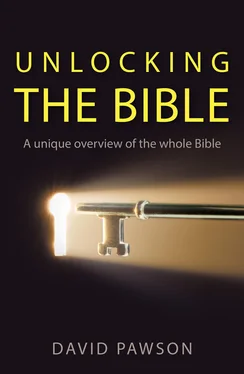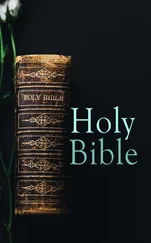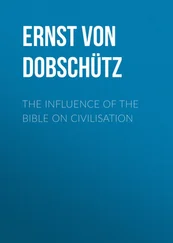There are over 90 references to Leviticus in the New Testament, so it is a very important book for Christians to get to grips with.
THE FULFILMENT OF THE LAW
What, then, are we to make of the law of Moses today, remembering that there are not just 10 laws but 613 in total? We may have a hunch that we are not tied to them all, but how many are we tied to? For example, some churches teach their members to tithe. Others have strict rules about the Sabbath, even if for them the Sabbath is Sunday, not Saturday as observed by the Jews? Every Christian has to come to terms with this difficulty. It is complicated by the fact that Jesus said, ‘I have not come to destroy the law, but to fulfil it.’
We must therefore ask how each law is fulfilled. It is obvious that some are fulfilled in Christ and finished with. That is why you do not have to take a pigeon or a lamb to church when you go to worship next Sunday. The laws about blood sacrifices have been fulfilled.
In a similar way the Sabbath law is fulfilled for us every day of the week when we cease to do our own works and do God’s instead, thus entering into the rest that remains for the people of God. We are still free to keep one day special if we wish, but we are also free to regard every day alike. So we cannot even impose Sunday observance on other believers, never mind unbelievers, for we are all free in Christ.
It is very important to realize exactly what the fulfilment of each law is. Of the Ten Commandments, nine are repeated in the New Testament in exactly the same way, e.g. you shall not steal, you shall not commit adultery. The Sabbath one is not, being fulfilled in a very different way.
Other laws of Moses are fulfilled in different ways. One law in Deuteronomy says, for example, that when you are using an ox to thresh the corn, walking round and round, its hooves breaking the wheat from the chaff, you must not put a muzzle on it because it has every right to eat what it is preparing for others. This is fulfilled in the New Covenant. Paul quotes that law and gives it a completely different fulfilment, explaining that in the same way those who live for the gospel have a right to expect financial support from others. It is necessary to look at each law and see how it is fulfilled in the New Testament and given a deeper meaning.
There are, however, four crucial things that we learn from the book of Leviticus which are unchanged in the New Testament.
1. THE HOLINESS OF GOD
There is no book in the Bible which is stronger on the holiness of God than Leviticus and it is something we forget at our peril, especially in an age when people ask the question: ‘How can a God of love send anyone to hell?’ We know through Jesus that God is a God of love, and Jesus also spoke openly about hell. We cannot pick and choose: if Jesus told the truth about God being a God of love, we must also accept that he spoke the truth about hell.
Actually, God’s understanding of love is a little different from ours. Ours is sentimental love, his is holy love. His love is so great that he hates evil. Very few of us love enough to hate evil. We learn about the holiness of God from the book of Leviticus. We learn to love God with reverence, with holy fear. Hebrews says, ‘Let us worship God with reverence and awe, for our God is a consuming fire.’ This is a sentiment the writer got straight out of Leviticus. It is vital for Christians today to read Leviticus, in order to keep hold of this sense of God’s holiness.
2. THE SINFULNESS OF MAN
Leviticus strongly underlines the sinfulness of man as well as the holiness of God. It is so realistic and down to earth. Here is human nature, capable of bestiality, incest, superstitions, and many other things which are an abomination to God. ‘Abomination’ means something that makes you want to be physically sick because you are so disgusted. The Hebrew word for it is a very, very strong expression; the English translations – abomination, loathsome, vile, revolting – are all just poor substitutes.
The Bible is about God’s emotions. God’s emotional reaction to sin comes because he is holy. The sinfulness of man is not just in polluting clean things, but also in profaning holy things. Common swearing is the profaning of holy words. There are only two sacred relationships in our lives – that between us and God, and that between man and woman. Ninety per cent of swearwords come from one of these two relationships. Mankind profanes holy things and pollutes clean things. We live in a world that is doing both, and the sinfulness of man is not only in making clean things dirty, but in making holy things common and in treating things as common when they are not.
3. THE FULLNESS OF CHRIST
Leviticus points towards the fullness of Christ and his sacrifice, once for all. God has provided a way of cleansing the sin from mankind. His problem is how to reconcile justice and mercy. Should he deal with this sin in justice and punish us, or should he deal with it in mercy and forgive us? Since God is both just and merciful, he must find a way of being just and merciful at the same time. It is impossible for us to find a way, but it has been possible for him – by the substitution of an innocent life for a guilty life. Only when that happens are both justice and mercy satisfied. The sacrificial laws of Leviticus begin to show us how that can happen.
There are particular words associated with this process which occur many times. ‘Atonement’ and ‘blood’ are frequently mentioned, because in the blood is the life. If a person’s blood is taken away, their life is taken away. ‘Offerings’ are also frequently mentioned. The burnt offering speaks of the total surrender that is needed. The meal offering speaks of our service. The peace offering tells us of the serenity we can have with God. These are the three things that should characterize a grateful life, a life that has been saved.
Yet we note too God’s side of the equation, his sacrifice. The only sacrifices we now have to bring to the Lord are the sacrifices of praise and thanksgiving, and these should be properly prepared and brought before him. But the sacrifices in Leviticus also speak of the sacrifice that Jesus made. The sin offering tells us about the substitution of an innocent life for the guilty, and the trespass offering brings home to us that this sacrifice satisfies divine justice, that there is some law that is being met by it. It all looks straight forward to the New Testament.
4. GODLINESS OF LIFE
Leviticus tells us to be holy in every part of our lives, even down to our toilet arrangements! Holiness is wholeness, which is why we can read of the incredible detail God goes into as he applies his holiness to every part of his people’s lives. It tells you that a godly life is godly through and through or it is not godly at all.
It is important to note, however, that there are two major shifts between the holiness of the Old Covenant and the holiness of the New. In Leviticus there is the triple division between holy, clean and unclean. This still applies in the New Testament, but there are two major alterations to it.
First, holiness is moved from material things to moral things. The children of Israel were children and they had to be taught as children. They had to learn the difference between clean and unclean in matters of food, for example. Christians have no such rules, however. It took a vision to teach this to the apostle Peter. Jesus said that it is not what goes into your mouth that makes you unclean now, but what comes out of your mouth. Being clean or unclean is no longer a matter of clothes and food, but of clean and unclean morality. It has shifted from the material to the moral. Now we do not have all those regulations about clothes and food, but we do have a lot of teaching about how to be holy in moral questions.
Читать дальше











